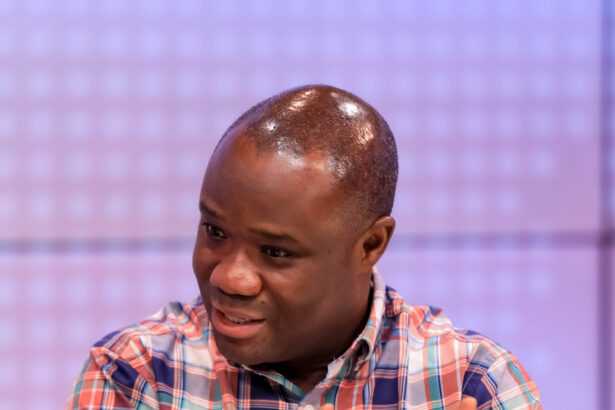Politics
Ghana’s Economic Health Sparks Heated Government Debate Ahead of Budget Release


A sharp dispute over Ghana’s economic legacy has erupted within government ranks, as Felix Kwakye Ofosu, Minister of State for Government Communications, publicly rejected claims by Former Deputy Finance Minister Stephen Amoah that the current administration inherited a stronger economy than the one it took over in 2016.
The clash, unfolding days before the critical March 11 budget presentation, underscores deepening political tensions over Ghana’s fiscal trajectory.
“The assertion that today’s economy is better than 2016’s is demonstrably false,” Kwakye Ofosu declared during an interview on JoyNews’ Newsfile, pointing to the plight of 1.3 million bondholders forced to accept steep losses under the Domestic Debt Exchange Programme (DDEP). “These citizens endured excruciating cuts to interest rates and extended payment terms—a clear sign of systemic distress,” he argued. His remarks reflect broader public frustration over austerity measures tied to Ghana’s $3 billion IMF bailout, which have squeezed households and businesses alike.
The minister vowed that the upcoming budget would reveal “18 indicators” proving economic deterioration since 2021, with only GDP growth showing improvement. He specifically contested Amoah’s claim that the previous government left a primary balance surplus—a measure of fiscal health excluding interest payments. “They missed their own 0.5% surplus target. The data will speak for itself,” Kwakye Ofosu stated, though he did not provide immediate evidence.
The debate carries high stakes for public trust. Bondholders, many of whom are retirees or middle-class savers, have staged protests over the DDEP’s impact, accusing the government of breaching contractual trust. Economists note that while debt restructuring was necessary to stabilize the economy, its execution has eroded confidence in state financial stewardship.
Amoah’s office has yet to respond, but the exchange highlights fissures within the ruling coalition as it navigates recovery efforts. Critics argue the government risks politicizing economic data at a time when transparency is crucial. “These figures aren’t abstract—they dictate jobs, prices, and investor decisions,” said Accra-based financial Journalist Roger A. Agana. “Both sides must prioritize accuracy over rhetoric.”
As Ghana awaits the budget’s unveiling, the controversy raises questions about how fiscal policies will address mounting challenges: inflation lingering near 23%, a cedi under pressure, and a debt-to-GDP ratio still hovering at 85%. For citizens, the outcome hinges not on political sparring, but on tangible relief from the cost-of-living crisis.
Source: newsghana.com.gh



President Mahama to walk the runway at Ghana Fashion Week in July
In a bold and exciting announcement, President John Dramani Mahama revealed that he will make a special appearance on the...


Chez Amis gifts herself Rolls Royce Cullinan on birthday
Renowned Accra-based restaurateur Chez Amis has marked her birthday in grand style by gifting herself a brand-new Rolls Royce Cullinan,...


Akosua Ago Aboagye joins Sompa FM as Accra branch radio manager
Seasoned broadcaster Akosua Ago Aboagye has joined Sompa FM as the Radio Manager for its Accra branch. She made the...


Mahama unveils ‘Black Star Experience’ to boost tourism and culture
President John Dramani Mahama has announced the launch of ‘The Black Star Experience’ as part of his administration’s vision to...


Akosua Ago Aboagye resigns from Despite Media after 20 years
After two decades with Despite Media, seasoned broadcaster Akosua Ago Aboagye has officially announced her resignation. In an emotional farewell...


Lilwin to pay GH₵300,000 to Martha Ankomah in GH₵5million defamation suit
Ghanaian actors Martha Ankomah and Kwadwo Nkansah Lilwin have settled their defamation dispute, bringing an end to the GH₵5 million...
Trending
-

 Showbiz6 days ago
Showbiz6 days agoThe African Giant is dead – Burna Boy says his people killed him
-

 Showbiz2 weeks ago
Showbiz2 weeks agoPlus-size advocate and actress Monalisa Stephen passes away
-

 Showbiz1 week ago
Showbiz1 week agoDada KD died after being turned away from two hospitals – Manager reveals
-

 Showbiz2 weeks ago
Showbiz2 weeks agoVeteran singer Dada KD reportedly dead
-

 Showbiz2 weeks ago
Showbiz2 weeks agoThe most shocking takeaways from Cassie Ventura’s testimony against Diddy
-

 Showbiz1 week ago
Showbiz1 week agoDavido’s barber reflects on humble beginnings and loyalty
-

 Showbiz2 weeks ago
Showbiz2 weeks agoNigerian TV journalist Bukola Agbakaizu dies while on duty
-

 Showbiz2 weeks ago
Showbiz2 weeks agoThey have used me – Oheneni Adazoa breaks ties with NPP
